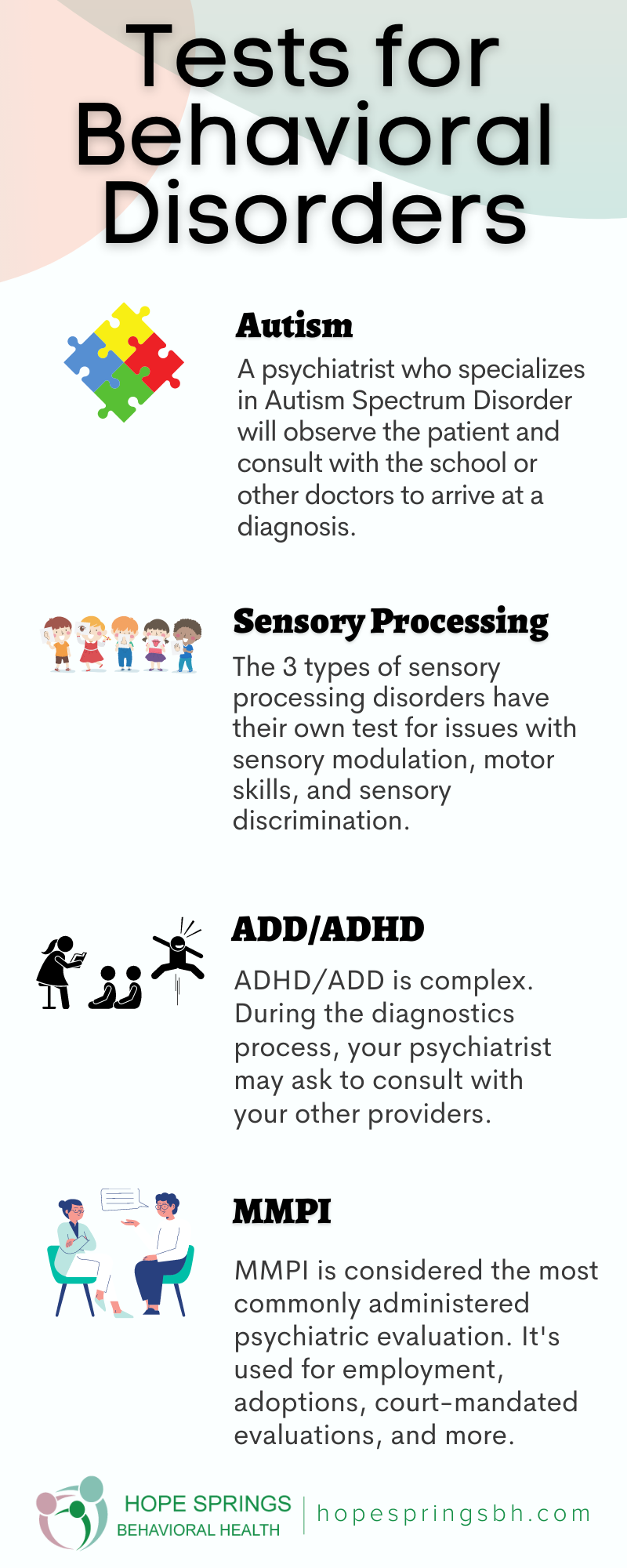Behavioral disorders can be categorized in several different ways. In general, behavioral disorders are any pattern of behavior that regularly interferes with an individual’s ability to live a physically and mentally healthy life for more than six months. Though behavioral abnormality is a common symptom of bipolar disorder, depression, anxiety, schizophrenia, and other mental health disorders, behavioral disorders are diagnosed separately.
If you are struggling with behavior that may be interfering with your quality of life, there are several tests available to help. After you complete the testing process, a qualified mental health professional should have a better idea of moving forward with your treatment and improving your quality of life.

Types of Tests for Behavioral Disorders
Autism Testing
Autism testing is conducted by a psychiatrist who specializes in autism. Autism testing is not necessarily a straightforward process of “sitting down to take a test.” Once you have decided to pursue autism testing for yourself — or your child — your psychiatrist will conduct a period of observation, communication with your primary care physicians and school faculty. Recent studies have suggested that individuals on the autism spectrum tend to have related diagnoses, such as social communication disorder.
Sensory Processing Testing
Sensory processing disorders are categorized in 3 ways: sensory modulation disorder, sensory-based motor disorders, and sensory discrimination disorders. Each of these categories has its own test and diagnostic procedure.
Attention Deficit Disorder (ADD) and Attention Deficit Hyperactivity Disorder (ADHD)
ADD and ADHD used to be diagnoses reserved for the classic hyper child — the one that’s always “bouncing off the walls.” Decades of research have advanced our understanding of the complexity of attention disorders. Modern understanding dictates that there are six types of ADD. Each type of ADD affects the brain differently, and improper medication can lead to dangerous imbalances in other places in the brain.
As such, the diagnostics process must be thorough and dynamic. Like autism testing, your psychiatrist may want to consult with your primary physician, mental health providers, and school staff before delivering their diagnosis.
Minnesota Multiphasic Personality Inventory (MMPI)
Considered the most commonly utilized behavioral test in the country, the MMPI is mandated for several different clearances, including:
- Government employment
- Court-mandated evaluations
- Adoptions
- Career candidacy
- Police Academy, or jobs that require firearm training
- Diagnostic measurement for self or others
The MMPI is conducted by a licensed psychologist in person. After completing their report, the psychologist will call the patient back for a second appointment to discuss and explain the results, provide documentation of the test and its results, and pursue any necessary treatment.
Cost of Testing
In the American healthcare system, cost is always a factor. When it comes to behavioral health testing, each test comes with its own price tag. Most psychiatrists will disclose their fee range for each test before they conduct it.
Each test’s cost is determined by the amount of time required to arrive at a diagnosis, any outside consultations, and visits to the patient’s school or place of work. As always, it’s important to discuss your options with your healthcare provider and insurance company before you make any drastic decisions. Some insurance companies will cover the test’s cost outright; some may require co-pays, and others may reimburse after a diagnosis. For insured patients, many insurance companies will cover the cost of treatment after the official diagnosis.
For more information about testing for behavioral health disorders, don’t hesitate to reach out today!


